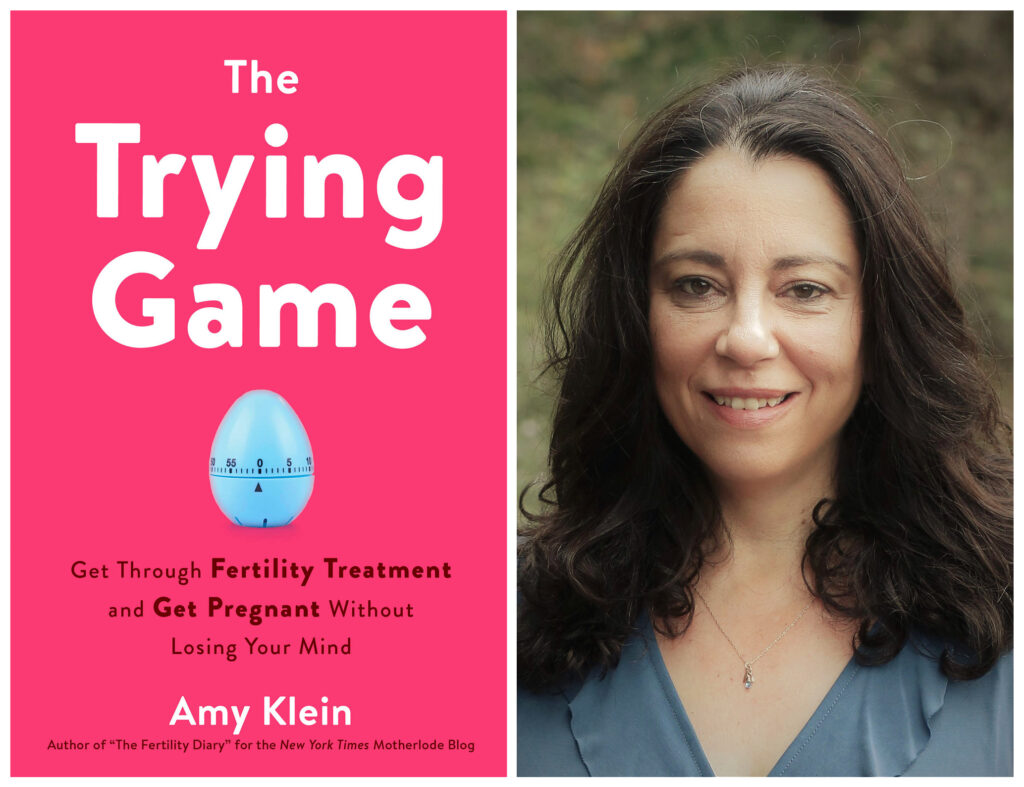
As a journalist, Amy Klein wrote about many of her personal explorations, from skydiving to bee-keeping. When she found herself on a long path to having a child, though it was incredibly difficult, the process also fascinated her. Some compelling (and odd) things were happening in infertility clinics and on her journey, so she wrote a New York Times column about it for two years.
We talked with Amy about her path to motherhood, how the infertility world has changed since her early “secret society” days, and why she wrote her book The Trying Game.
Q: What’s your infertility/family story in a nutshell?
Short: I had four miscarriages, nine rounds of IVF, two donors, and one reproductive immunologist who helped me have my daughter.
Long: I got pregnant right after I got married at 41, miscarried, got pregnant again, miscarried what I later learned was a healthy 10-week embryo. Started IUIs, didn’t get pregnant. Started IVF, got pregnant, miscarried. Did more IVF. Moved to Israel for free IVF and genetic testing — none of my embryos were normal. I used a donor egg and miscarried again. I realized it wasn’t my eggs, like the doctors were telling me, but my body! I went to a reproductive immunologist to regulate my hormones, got pregnant, and with a high dose of steroids and other drugs, carried the healthy daughter until 41 weeks.
I had to write about this, both as a journalist and as someone who wanted to help others going through the same thing — so they could understand how complicated and heart-wrenching it can be.
Q: Why did you decide to document your journey through a public column in the New York Times?
Back in 2011 and 2012 there was no information about infertility and IVF in a public forum. There was no Instagram, no Facebook groups devoted to every diagnosis, no articles in Cosmopolitan and Refinery 29 about IVF, miscarriage, egg freezing — nothing. I felt like I had entered this secret Skull & Crossbones world, and as a journalist, it was so interesting: Women lining up at 6 am before they went to their C-suite jobs and men heading to “collection” rooms to watch porn.
Why is no one writing about this? I thought. I’d always written about what I was doing, from skydiving to honey-collecting to bee-keeping. I had to write about this, both as a journalist and as someone who wanted to help others going through the same thing — or who knew people who were — so they could understand how complicated and heart-wrenching it can be.
Q: What have you seen change in the world of infertility/fertility treatments since you started documenting it as a journalist?
It seems like more people are talking about it, writing about it, sharing their stories on social media — especially celebrities — and I’m grateful for that.
I think that the next generation of doctors has gotten better at being partners with patients, better able to explain treatment and listen to patients.
The science, of course, keeps changing — new acronyms, new treatments, new protocols — but the emotional journey is largely the same. You go from “Oh, @#$#! Am I going to be infertile?” to having to find a doctor, to dealing with non-empathetic friends, relatives, and sometimes even partners, to feeling like no treatment is ever going to work, to needing the strength to power on.
More people are talking about it, writing about it, sharing their stories on social media — especially celebrities — and I’m grateful for that.
Q: Tell us about The Trying Game and why you were compelled to write this book now?
I always thought I’d write a memoir of my experiences. But after I had a baby and climbed out of the first year or two of exhaustion, the fertility landscape had changed, from there being no information out there to too much information out there. Infertility stories and advice seemed to be everywhere!
I decided the story was bigger than my own situation and I wanted to help people get through the entire journey, both emotionally and medically. That’s why I interviewed patients, doctors, and therapists about everything from “baby envy” and “perseverance” to “when is it time to quit” and “motherhood after infertility.” I wanted to give people an A-to-Z guide to infertility, share the right questions to ask, and help them through the process. I also want them not to feel alone. When I interviewed gay and lesbian and transgender people, I realized that though we may be different, we all go through the same things.
Q: For someone new to this crazy journey, any advice?
To quote The Hitchhiker’s Guide to the Galaxy: “Don’t Panic.” You may have trouble trying, but it doesn’t mean you’re going to need years of treatment or spend tens of thousands of dollars. It may be a quick fix or take just a drop longer. You don’t need to know everything yet, so don’t go down that rabbit hole. Take it one treatment or cycle at a time.
